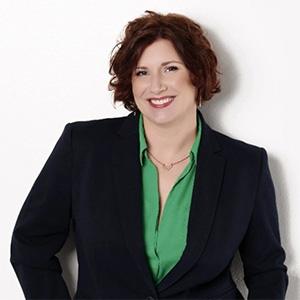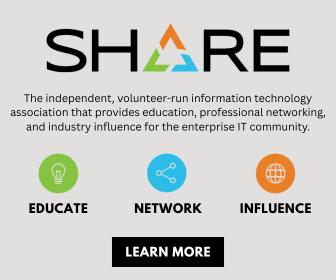Magie Hall, Ph.D., is an associate professor of information systems and quantitative analysis at the University of Nebraska Omaha. She’s also one of the very few tenured professors doing scholarly work in mainframe education.
She didn’t plan to build a workforce pipeline. But one night—and several glasses of wine—changed that.
A conversation with a colleague about the failures of online education turned into a brainstorm about how to use online courses to do the most good. And it led to a radical idea: What if adults experiencing homelessness or in addiction recovery programs could learn enterprise technology skills like COBOL and Python?
What if adults experiencing homelessness or in addiction recovery could learn enterprise technology skills like COBOL and Python?
Fast-forward a few years. Hall applied for and received a $500,000 National Science Foundation award for the “Work-Learn” training program. Along with a pilot grant from Meta to design and test the curriculum, Hall transformed a late-night lament over pinot gris into a real-world training program.
Real Skills, Real Support
The program is designed as a Massive Open Online Course (MOOC). MOOCs are large, online educational programs that offer free or low-cost courses to many participants, often open-source.
Hall’s Work-Learn MOOC covers computational thinking, Python, and COBOL—skills industry partners identified as in demand but rarely taught. Designed as short online modules, participants earn a modest stipend for each completed unit. The structure is intentional: learn, earn, repeat.
The structure is intentional: learn, earn, repeat.
However, unlike typical MOOCS, Hall’s program comes with built-in support. Students live in residential dormitory-style living. They can borrow laptops, ask questions via a dedicated Slack channel, and access 24-hour help from interns and staff.
The program is based at Siena Francis House in Omaha, Nebraska, one of the Midwest’s largest service centers for adults experiencing homelessness. The organization contributes workforce development staff and a computer lending desk to the program. Participants in Work-Learn are drawn directly from Saint Francis House’s residential recovery program, including substance use.
“They’ve got structures in place we couldn’t replicate on our own,” Hall notes. “We couldn’t do this without our partners.”
New Students, New Opportunities
Hall is quick to point out that these students don’t fit the stereotype of homelessness — if there is one. Many have held steady jobs, raised families, and shown grit in navigating life setbacks. Hall sees what many others missed: potential.
“These are people who are curious, who are willing to take a risk, who are showing every level of resilience,” she says. “Imagine what you have to go through to find yourself at my doorstep.”
These are people who are curious, who are willing to take a risk, who are showing every level of resilience.
As for concerns about the material being too advanced, Hall dismisses doubters outright. “If you can read sixth or seventh-grade English, then you can read COBOL,” she offers. “It was designed to be understood by non-computer people. You just have to figure out the logic behind it – and you have to have that opportunity.” Which is exactly what she spun up.
Hiring Challenges Unrelated to Skills
At its core, the Work-Learn learning program is about learning skills for lifelong job opportunities. However, barriers to employment are not always related to skills. Hall is candid about the limits and biases baked into specific industries. Companies and industry sectors traditionally relying heavily on mainframes tend to be fairly culturally conservative.
Some participants have felony records, visible tattoos, or unconventional educational backgrounds. While they can’t undo the past, the Work-Learn team addresses business etiquette, what business casual means, how to wear hair in a corporate environment, and how to prepare for interviews.
It’s a two-way street. If the mainframe industry wants to attract talent, it must be open to hiring nontraditional talent who show up as they are. This is part of what Hall calls partner education.
Results
So far, more than 75 people have started the program, with several approaching graduation and job readiness in 2025. Completion rates hover around 10%, mirroring global online education averages. While 10% may sound low, Hall sees this as proof that traditional online education isn’t working for anyone, regardless of housing status.
“If this population—with all the motivation in the world—still doesn’t finish at a higher rate, it tells us the system is broken,” she says. “Online education isn’t delivering the results we think it is.”
She’s already begun drafting new research proposals to explore that question.
A Different Kind of Professor
In addition to the Work-Learn project, one of Hall’s feats is helping bring COBOL back to the University of Nebraska Omaha for the first time in over 20 years. The reintroduced course was filled immediately in fall 2024—and even had a waitlist.
Hall credits packaging mainframe coursework differently for its triumphant return. “The students don’t want to be trained in things that pigeonhole them,” Hall says adamantly. “It’s a little bit of everyone’s challenge to show where, why, and how this is really exciting.”
Her work is being noticed. Hall received a 2025 Nebraska Women in Tech Award, and spoke at multiple conferences and on TechStrong TV. Hall has 91 publications to her name on topics ranging from American-Israeli politics to urban food deserts, social media collaboration to bias in information systems communication, predicting shifts from freemium to premium, and, of course, COBOL.
How does she manage to fit it all in? “Like most academics, I’m a workaholic!” she chuckles. Outside the University, Hall travels with her husband and spends time with their pocket bully dog, Frida.
Hire Her People
Her ultimate goal? Jobs. Ideally, every single person who’s touched the Work-Learn program as a student gets a job. Perfection is Hall’s goal, but she regrettably acknowledges perfection is not a standard to operate on.
Hire our learners. They’ve shown resilience. They’ve shown commitment. They’ve learned the skills. Now give them a chance.
Hall’s aim is clear: “Hire our learners,” she says without hesitation. “They’ve shown resilience. They’ve shown commitment. They’ve learned the skills. Now give them a chance.”
The students in the Work-Learn program may not be traditional, but neither is Magie Hall. And that’s a great thing.You can learn more or connect directly with Magie Hall, Ph.D., through her University of Nebraska Omaha profile or via worklearnproject@gmail.com.









0 Comments